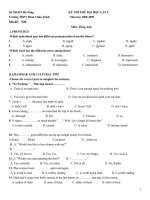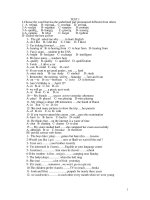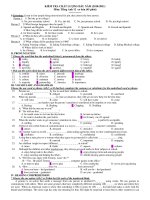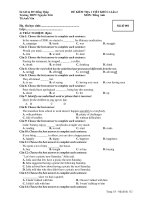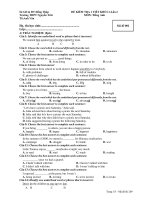ĐỀ KIỂM TRA HỌC KÌ I NĂM HỌC 2010-2011 Môn : TIẾNG ANH – Mã đề thi 209 pdf
Bạn đang xem bản rút gọn của tài liệu. Xem và tải ngay bản đầy đủ của tài liệu tại đây (69.98 KB, 2 trang )
TRƯỜNG THPT TRƯNG VƯƠNG ĐỀ KIỂM TRA HỌC KÌ I –NĂM HỌC 2010-2011
Môn : TIẾNG ANH – Lớp 12
Thời gian làm bài: 45 phút (không kể thời gian giao đề)
Họ, tên thí sinh: ……………………………Lớp:…… Mã đề thi 209
Read the following passage and mark the letter A, B, C, or D on your answer sheet to indicate the correct answer to each of
the questions from 1 to 5.
CAMBRIDGE
"Where is the university?" is a question that many visitors to Cambridge ask, but no one can give them a clear answer, for there
is no wall to be found around the university. The university is the city. You can find the classroom buildings, libraries, museums and
offices of the university all over the city. And most of its members are the students and teachers or professors of the thirty-one colleges.
Cambridge was already a developing town long before the first students and teachers arrived 800 years ago. It grew up by the river
Granta, as the Cam was once called. A bridge was built over the river as early as 875. In the fourteen and fifteen centuries more and more
land was used for college buildings. The town grew much faster in the nineteen century after the opening of the railway in 1845.
Cambridge became a city in 1951 and now it has the population of over 100,000. Many young students want to study at Cambridge.
Thousands of people from all over the world come to visit the university town. It has become a famous place all round the world.
1. Why do most people come to Cambridge?
A. To read books in the libraries. B. To study in the colleges.
C. To see the university. D. To find the classroom buildings.
2. When was more land in Cambridge used for college buildings?
A. In the 14th century. B. In the 15th century. C. In the 19th century. D. Both A & B.
3. When did the town really begin developing?
A. In 800. B. In 1845. C. In 875. D. In 1951.
4. Why did people name Cambridge the "city of Cambridge"?
A. Because there is a bridge over the Cam. B. Because it was a developing town.
C. Because the river was very well-known. D. Because there is a river named Granta.
5. Why do many visitors to Cambridge ask "Where is the university"?
A. Because there is no wall to be found around the university.
B. Because it is very difficult to find the way to the university.
C. Because the university looks like a museum.
D. Because the university looks like a library
.
Mark the letter A, B, C or D on your answer sheet to show the underlined part that needs correction.
6. "You'd better think carefully before decide to get married "said the woman to me.
A
B C D
7.
Ann started studying non-verbal form of communication years ago.
A
B
C D
8.
As soon as Martha will get a good job , she is going to buy a house.
A B
C
D
9.
During the school year I'm not allowed to watch TV until I finished my home work.
A B C D
10.
Although I'm not interested in mathematics but I try my best to get good marks.
A
B C D
Mark the letter A, B, C or D on your answer sheet to indicate the correct answer to each of the following questions.
11.
He is overweight. He eats too much.
A.
If he didn't eat too much, he would be overweight.
B. He wouldn't be overweight unless he ate too much.
C.
If he didn't eat too much , he wouldn't be overweight.
D. He wouldn't be overweight unless he didn't eat too much.
12
.
My teacher said to me "Have you done the exercise?"
A. My teacher asked me have you done the exercise.
B. My teacher asked me if I had done the exercise.
C. My teacher asked me if had I done the exercise.
D. My teacher asked me I had done the exercise.
13.
The last time I met my youngest sister was ten years ago
A. It was ten years since I have met my youngest sister. B. I haven't met my youngest sister for ten years
.
C. I met my youngest sister ten years ago . D. The last time I met my youngest sister is ten years ago.
14
. The woman was too weak to lift the basket.
A. The woman shouldn't have lifted the basket because she was weak.
B. The woman couldn't lift the basket so she was very weak.
C. The woman was so weak that she couldn't lift the basket.
D. Although she was very weak, she could lift the basket
15.
They didn't buy anything from the supermarket.
A. Nothing wasn't bought from the supermarket.
B. They didn't have enough money to buy anything from the supermarket.
C. Nothing was bought from the supermarket.
D. They didn't want to buy anything from the supermarket.
Mark the letter A, B, C, or D on your answer sheet to indicate the word whose underlined part is pronounced differently
from that of the rest in each of the following questions.
16. A. resume B. position C. statistics D. designer
17. A. arrives B. laughs C. likes D. helps
18. A. missed B. filled C. ploughed D. watched
Mark the letter A, B, C, or D on your answer sheet to indicate the word whose main stress is placed differently from the
others.
19. A. attention B. exciting C. impolite D. attracting
20. A. discuss B. visit C. suppose D. attract
Mark the letter A, B, C or D on your answer sheet to indicate the correct answer to each of the following questions.
21.
More than ten victims _______ missing in the storm last week.
A. are reported to have been B. are reported to be C. are reporting to have been D. are reporting to be
22. We _______ touch since we _______ school three years ago.
A. have lost / left B. have lost / leave C. lost / have left D. were losing / had left
23.
If it rained heavily, the fields________flooded now .
A. would be
B. had been
C. will be
D. can be
24. The boy waved his hands to his mother, who was standing at the school gate, to _______ her attention.
A. follow B. pull C. attract D. tempt
25. My father phoned me to say that he would come _______ home late.
A. a B. Ø C. the D. an
26. Few Asian students agreed _______the American students' view that wives and husbands should share all thoughts.
A. with B. on C. for D. to
27. The conical leaf hat is made_____a special kind_______bamboo and young and soft palm leaves
A. in / for B. from / of C. on / for D. of / of
28. The young man who lives next door is very kind to my family.
A. to live next door B. he lives next door C. lived next door D. living next door
29. Tom's company will almost certainly fire him _______ he improves his attitude.
A. otherwise B. or C. unless D. if
30. The teacher told Joe _______.
A. stops talking B. stop talking C. to stop talking D. stopped talking
31. _______ want to get a god job have to have certain qualifications and experience.
A. Who B. Those who C. Those which D. Those whom
32.
_______, he walked to the station.
A. Despite tired B. Although to be tired C. In spite being tired D. Despite being tired
33.
_______ he had enough money, he refused to buy a new car.
A. In spite B. Although C. Despite D. In spite of
34. When we came to their house , they____________chess.
A. played
B. are playing
C. were playing
D. have been playing
35.
-How well you are playing! -___________________.
A. Say it again. I like to hear your words B. Many thanks. That is a nice compliment
C. Thank you too much D. I think so. I am proud of myself
Read the following passage and mark the letter A, B, C or D on your answer sheet to indicate the correct word for each of
the blanks from 36 to 40.
Although most families in the United States enjoy a high living standard, many American women have to work
(36) _______at home and in their offices . Despite their husbands’(37) _______ of the housework, women have to do
(38) _______of the housekeeping tasks. In single-parent families, the mothers may not have (39)______children to take care of,
but they have to raise their families alone and have to provide for all the
housekeeping
money. Therefore, the
single
mothers
have to work very hard to earn their living. Moreover, in spite of the fact that the single mothers have all the
modern
conveniences at their homes, they find that bringing up their (40) _______children alone is not easy.
36. A. hard B. hardly
C. fast
D. equally
37. A. refusal
B. need
C. share
D. responsibility
38. A. lot
B. a little
C. fewer
D. most
39. A. many
B. much
C. few
D. some
40. A. grown- up B. sick C. teenage D. weak
GOOD LUCK TO YOU
